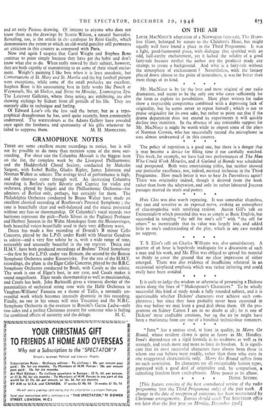GRAMOPHONE NOTES
THERE are some excellent recent recordings to notice, but it will not be possible to do more than mention some of the most out- standing. For sheer size the Columbia Messiah is the biggest item on the list, the complete work by the Liverpool Philharmonic and the Huddersfield Choral Society, conducted by Malcolm Sargent, with Isobel Baillie, Gladys Ripley, James Johnston and Norman Walker as soloists. The average level of performance is high, and the choruses come through well. An interesting Columbia recording is Berlioz's early Reverie and Caprice for violin and orchestra, played by Szigeti and the Philharmonic Orchestra—for admirers of Berlioz only, perhaps, but certainly for them. The Philadelphia Orchestra conducted by Bruno Walter have made an excellent classical recording of Beethoven's Pastoral Symphony ; the tone is beautifully clear and well-balanced and the music presented without any fuss or showmanship. Of Columbia's vocal records two baritones represent the pick—Paolo Silveri in the Pagliacci Prologue and Herbert Janssen in the Wahn Monologue from the Meistersinger, both beautiful voices beautifully used in their very different ways.
Decca has made a fine recording of Dvorak's B minor Cello Concerto, played by the L.P.O. under Rank! with Maurice Gendron as soloist—and a very fine soloist he is, with a wide range of tone, noticeably and unusually beautiful in the top register. Decca and H.M.V. have both produced recordings of Brahms' Third Symphony —the first by the L.P.O. under van Beinum, the second by the Boston Symphony Orchestra under Kussevitsky. For the rest of the H.M.V. recordings, the plum is the Elgar Cello Concerto, played by the B.B.C. Symphony Orchestra conducted by Boult, with Casals as the soloist. The work is one of Elgar's best, in any case, and Casals makes it sound magnificent. Elgar needs showmanship as well as musicianship, and Casals has both. John Barbirolli gives a virtuosic display of the potentialities of orchestral string tone with the Halle Orchestra in Vaughan-Williams' Fantasia on a theme of Tallis, a normally un- eventful work which becomes intensely dramatic in this recording. Finally, no one in his senses will miss Toscanini and the N.B.C. Symphony Orchestra in the overture to Rossini's Gazza Ladra—only two sides and a perfect Christmas present for someone who is feeling
the combined effects of austerity and the deluge. M. C.


































 Previous page
Previous page